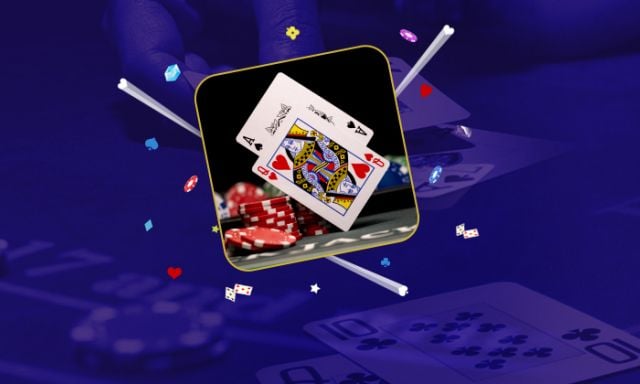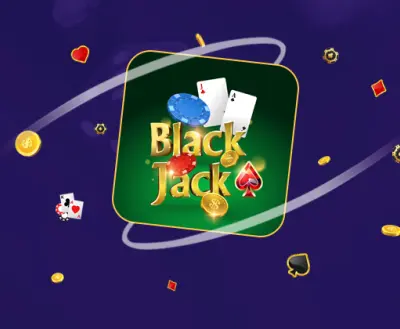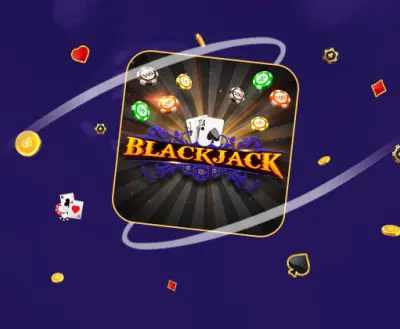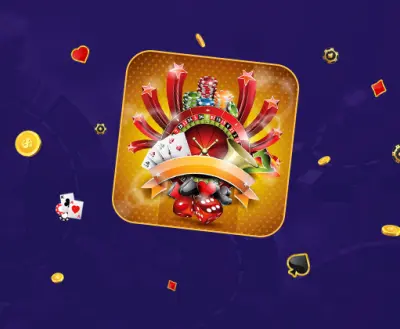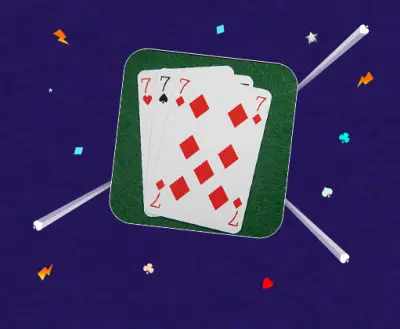Common Blackjack Mistakes: A Guide for Players
Key Takeaways:
- Understand the Basics of Blackjack: Familiarise yourself with the rules of the game and grasp the basic strategy to play effectively.
- Emotion Control: Don't let your feelings, whether they are of excitement or frustration, influence your decisions. Always make logical and strategic choices.
- Importance of Dealer's Up Card: Always consider the dealer's visible card as it plays a crucial role in determining your strategy for a given hand.
- Card Counting Skills: Remember that card counting requires extensive practice and a good memory. Don't overestimate your abilities as it can lead to costly mistakes.
- Bankroll Management: Set a budget for your game and stick to it. This includes setting a loss limit and a win limit, and adjusting your bet size according to the state of your bankroll.
- Setting Goals: Before you start a game, set clear targets for how much you are willing to win or lose during each session. This keeps your gaming experience disciplined.
- Use Money Management Strategies: Experienced players use strategies like the Kelly Criterion or the 1-3-2-6 system to manage their bets effectively. Such strategies can help maximise profits and minimise losses.
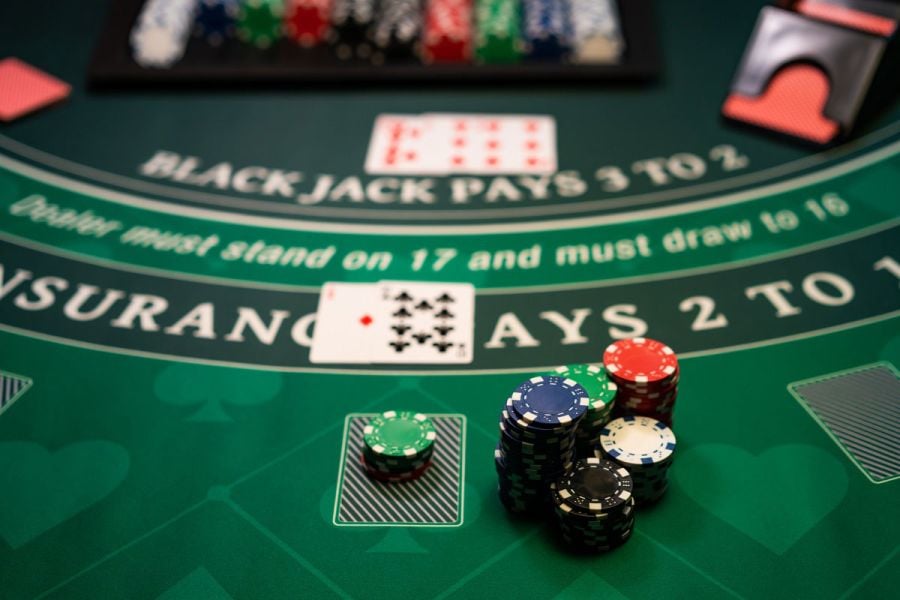
Table of Contents
Avoiding Common Blackjack Mistakes
One crucial aspect of playing blackjack successfully is avoiding common mistakes that most players make. These errors can range from playing with emotions rather than logic to ignoring blackjack basic strategy guidelines. Making impulsive decisions based on emotions like excitement or frustration often leads players astray since they do not consider all possible outcomes before acting on impulse.
For instance, chasing losses by increasing bets after losing streaks may seem like a good idea but could diminish bankroll quickly if losing streaks continue. Not understanding basic strategy guidelines is another mistake many new players make.
Basic strategy outlines the optimal decisions for each hand based on the player's cards and the dealer's up-card. This means that even a beginner can play with a strategic edge over the house.
Ignoring the dealer's up-card is another mistake many players make. The dealer's visible card can influence player decisions, indicating which actions have better odds of winning in various playing situations.
By avoiding these common mistakes in blackjack and live blackjack, you significantly increase your chances of winning at the game and having an enjoyable experience. Now let's move on to exploring these errors in more detail so that you can be sure to avoid them during your next casino session!
Playing with Emotions
Blackjack is a game of strategy. However, emotions can get in the way of making rational decisions. Whether you're nervous, excited, or disappointed, your emotions can cloud your judgement and lead to poor choices at the table.
Explanation of how emotions can affect decision-making in blackjack
Emotions can impact decision-making in several ways. For example, when you're feeling nervous, you may be more likely to take unnecessary risks or avoid taking risks altogether. This could cause you to miss out on opportunities to win big or lose unnecessarily.
On the flip side, getting too excited after a big win could lead you to make rash decisions like doubling down on a weak hand or taking insurance when it's not necessary. Similarly, being frustrated after a loss might cause you to chase losses by increasing your bet size and playing more hands than usual.
Examples of common emotional mistakes
One common emotional mistake is chasing losses. This occurs when players try to recoup their losses by increasing their bet sizes and taking riskier actions like splitting tens or doubling down on a losing hand. This rarely works out and often just leads to even bigger losses.
Another mistake is getting too excited after a win and becoming overconfident. Players who get caught up in the excitement of winning often start playing recklessly and risk losing all their profits by making foolish decisions at the table.
Similarly, players who are feeling nervous might choose not to hit on soft hands because they're afraid of busting. But this could actually hurt their chances of winning since hitting on soft hands increases the chances of getting close to 21 without busting.
Emotions can impact your decision-making, so take a step back to manage these emotional responses so that they don't interfere with your gameplay. Taking breaks when necessary, practising relaxation techniques like deep breathing, and focusing on the maths of the game can all help you keep your emotions in check and make better decisions at the table.
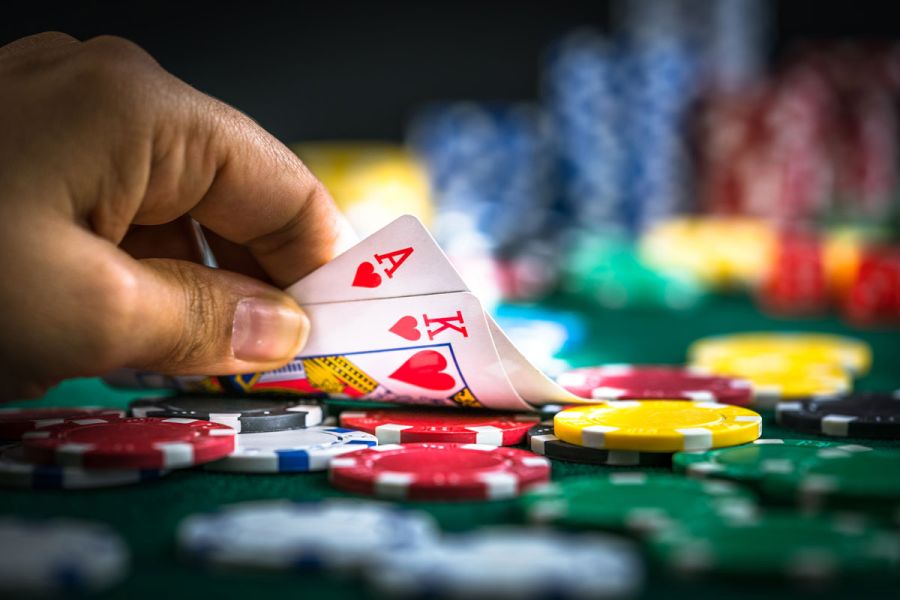
Not Understanding The Blackjack Basic Strategy
The Importance of Basic Strategy
If you're serious about winning at blackjack, then you need to understand the blackjack basic strategy. In fact, this basic strategy is the foundation upon which all good blackjack players build their game.
It's a set of rules that tells you the correct play for every possible hand that can be dealt to you, based on the dealer's up card. Learning and implementing basic strategy can greatly increase your chances of winning at blackjack.
Without it, you're basically playing a guessing game and relying on luck to win. With it, however, you can reduce the house edge and make more informed decisions that will help maximise your winnings.
Mistakes Made by Players Who Don't Understand The Blackjack Basic Strategy
One common mistake made by players who don't understand the blackjack basic strategy is hitting on a 17. Many inexperienced players feel that they need to take another card if their hand adds up to 17 or higher, but this is not always the best decision.
Depending on the dealer's up card and other factors such as whether or not you have an ace in your hand, standing on a 17 might be the better play. Another mistake is standing on a soft 17 (a hand that includes an ace counted as 11).
Novice players tend to stand pat because they believe that having an ace in their hand gives them an unbeatable total of 18. However, there are many situations where hitting a soft 17 is actually the better option.
Failing to double down on advantageous hands is another common mistake made by players who don't understand basic strategy. For example, if you have an Ace-2 against a dealer's up card of 5 or 6, doubling down would give you twice as much money if you win.
Not splitting pairs when it's appropriate can also lead to missed opportunities for winnings. For instance, if you're dealt a pair of 8’s and the dealer's up card is a 5 or 6, splitting those 8’s will give you two hands with much better chances of winning than keeping them as one hand.
Understanding basic strategy is essential for anyone who wants to become a skilled blackjack player. By learning the correct plays for every possible hand and avoiding common mistakes like hitting on 17 or standing on a soft 17, you can greatly improve your chances of winning at the table.
Related blackjack strategy guides:
Ignoring the Dealer's Up Card
When playing blackjack, it's crucial to pay attention to the dealer's up card. This is the card that is visible for all players at the table and can greatly influence your decisions. Ignoring the dealer's up card can lead to costly mistakes and missed opportunities to increase your winnings.
Explanation of how the dealer's up card can influence player decisions
The dealer's up card can provide valuable information about their hand, which can help you make better decisions on how to play yours. For example, if the dealer has a 6 showing, it means that they have a weak hand and are likely to bust (go over 21). In this case, it makes sense for you to play conservatively and avoid taking unnecessary risks.
On the other hand, if the dealer has a strong up card like an Ace or a 10, you need to be more cautious because they are more likely to have a strong hand. This means that you may need to take more risks in order to beat them or potentially try and push them over 21 by forcing them into difficult decisions.
Examples of common mistakes made by players who ignore the dealer's up card
Another one of the most common mistakes made by blackjack players is not doubling down when they have an advantageous hand based on the dealer’s upcard. For instance, if you have a total of 11 or lower and see that the dealer is holding anything less than seven then it’s best not to hesitate in doubling down as chances are high for winning big time. Another mistake players often make is failing to hit on soft hands when facing a weak dealer’s upcard.
Soft hands refer to any hand containing an Ace with one or more cards; such as A-7 against weak dealers’ 6’s through 2’s where doubling down isn’t advisable because there aren't enough cards left to draw from. Players may also stand on low hard totals when facing a strong dealer upcard.
For example, if you have a total of 12 and the dealer has 10 as their upcard, many players will stand because they don’t want to risk busting. However, in reality hitting is the better option as it increases your chances of drawing a card that will improve your hand.
Pay attention to what the dealer is showing and adjust your strategy accordingly for the best possible outcome.
Overestimating Card Counting Abilities
Many blackjack players are drawn to the concept of card counting, believing that it's an easy way to consistently win big at the casino. However, the truth is that card counting requires extensive practice and skill, and even then it's not a guaranteed way to win.
In fact, many players who overestimate their card counting abilities end up making costly mistakes that can cost them their entire bankroll. To successfully count cards in blackjack, you need to have an excellent memory and be able to keep track of multiple decks at once.
You also need to be able to do all of this while still appearing casual and nonchalant at the table so as not to draw attention from the casino staff. This takes time and practice - there are no shortcuts or quick fixes when it comes to mastering card counting.
The Pitfalls of Overestimating Your Abilities
One common mistake made by players who overestimate their card counting abilities is betting too much based on inaccurate counts. It's easy to get caught up in the excitement of having a high count and think you've got a great chance of winning big on your next hand. But if you haven't been keeping track accurately, you could end up losing a lot of money instead.
Another mistake is relying solely on card counting without paying attention to basic strategy. Even if you're able to keep an accurate count, if you're not making optimal decisions based on that count, you won't see much success in the long run.
How To Avoid Overestimating Your Abilities
If you're interested in learning how to count cards in blackjack, start by practising with smaller bets at home before bringing your skills into a live casino environment. Keep track of multiple decks using flashcards or other memorization techniques, and work on being able to maintain a casual demeanour while still counting effectively.
It's also important to remember that card counting is not a foolproof way to win at blackjack - there's always an element of luck involved. You should never rely solely on card counting to make your bets, and always pay attention to basic strategy as well.
Not Managing Bankroll Effectively
Effective bankroll management is crucial for long-term success in blackjack. Bankroll management refers to the way you handle your money while playing blackjack. It involves setting limits on how much you are willing to lose and win, and sticking to those limits no matter what.
Failure to manage your bankroll properly can result in losing all of your money too quickly, which defeats the purpose of playing blackjack in the first place. One common mistake made by players is not setting a loss limit before sitting down at a table.
This can lead to chasing losses and continuing to play even when it's clear that luck is not on your side. Similarly, players often fail to set a win limit as well.
Winning too much can also be dangerous if you don't know when to walk away, as it can lead to overconfidence and careless betting. Another mistake is not adjusting your bet size based on the current state of your bankroll.
If you're on a losing streak, it's important to decrease your bet size so that you don't lose all of your money at once. Conversely, if you're winning consistently, increasing your bet size can maximise your profits.
Many players fail to separate their bankroll from other funds they may have available for gambling or spending. This makes it difficult to keep track of how much money is actually available for blackjack and can lead to poor decision-making.
The Importance of Goal Setting
One effective way to manage your bankroll is by setting goals before sitting down at a table. Determine how much money you are willing and able to spend on blackjack ahead of time, and stick with that amount no matter what happens during the game. In addition, set specific goals for how much you want to win or lose during each session.
For example, aim for an overall win goal of 50% or a loss limit of 20% of your bankroll for each session. This will help you stay focused and avoid chasing losses or getting too excited after a big win.
Money Management Strategies
There are several money management strategies that experienced blackjack players use to manage their bankrolls effectively. One such strategy is the Kelly Criterion, which involves adjusting your bet size based on the perceived edge you have over the house.
Another strategy is the 1-3-2-6 system, which involves increasing your bet size after each win and decreasing it after each loss. This can help maximise profits while minimising losses.
Ultimately, the key to effective bankroll management in blackjack is to be disciplined and consistent in your approach. Set goals, stick to your limits, and don't let emotions get in the way of making rational decisions.
Conclusion
Avoiding common blackjack mistakes is essential for maximising your chances of winning over the long term. By playing with discipline and using effective money management strategies, you can avoid losing all of your money too quickly and enjoy a more enjoyable experience at the tables.
Remember to set goals, stick to limits, and never let emotions get in the way of making rational decisions. With these tips in mind, you'll be well on your way to becoming a successful blackjack player!
Further Reading: How to Play Blackjack UK: A Comprehensive Guide.

